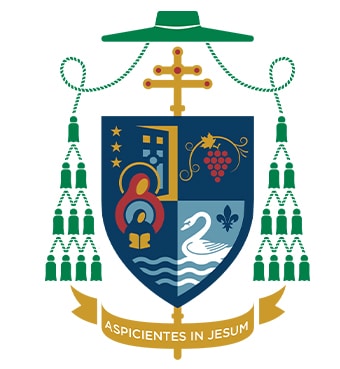Faith: The Giver’s First Gift

“What do you ask of God’s Church?” The catechumen responds to this question with, “Faith.” With this word, a catechumen presents himself for full reception into the Body of Christ.
I’ve always loved the simplicity of this opening. I also love the message. We don’t come demanding to be integrated into Christ’s body because we have faith. We come begging, asking God to give us the supernatural virtue that can ground our spiritual life as Catholics. Faith is, in fact, the only gift we ask for at that momentous juncture in life.
This is notably distinct from other significant rites of passage. When we present ourselves for the sacrament of matrimony, we don’t start by asking for the gift of love. Engaged couples, hopefully, love one another already, but, whether or not that’s true, they can commit themselves to spousal love. It is an act of will, not a feeling, after all.
In contemporary philosophy, some noteworthy scholars have worked hard to emphasize the ways in which religious faith is, in fact, not so different from other sorts of belief. The most famous of these is Alvin Plantinga, whose Warranted Christian Belief argues that belief in God can be “on all fours” with other kinds of belief, fully justified and available to rational inquiry. Plantinga made significant contributions to the field of epistemology (how and what we know), and his work has been genuinely important for many people. His goal was to explain why Christian faith is not irrational. That’s no small thing in an age that mistrusts faith and (at least ostensibly) prizes reason and rational discourse. Nevertheless, we shouldn’t lose sight of the ways in which faith is also different from other types of belief.
It is certainly possible to supply a person with reasons for believing in God, or in Christ’s saving power, or in the efficacy of the sacraments. We can offer personal testimony. We can use philosophy to answer particular objections and demonstrate the rational coherence of the faith. We can suggest ways in which the world seems inadequate to explain itself and observe how human experience constantly points beyond to something more.
Even so, the fact remains that the claims and promises of Christianity go well beyond our personal experience. In some sense, this might not seem entirely unique, since so many things are beyond our personal experience.
I believe in George Washington, though I have no personal memories of Colonial America. I believe in William Shakespeare, although I have never even been to Stratford-upon-Avon, England. Those truths, however, are at least in kind somewhat understandable, in light of my own life experiences. I have some understanding of people and the sorts of things they do; and if I’m especially interested, I can look for evidence about the lives of these particular people. Though they are not directly accessible, these truths fall within the scope of what I am able to understand and imagine on a purely human plane.
Faith, by contrast, requires me to direct my intellect and will toward truths that are far more amazing — truths that are, in fact, supernatural; truths our intellects can access only through divine revelation; truths our wills and intellects can submit to only through the grace of faith. I cannot easily furnish empirical proof of the efficacy of sacraments, for instance. St. Augustine’s declaration — “my soul finds no rest until it rests in thee” — seems intuitively true and wise. I know that my spirit is restless, and earthly attachments often make me unhappy. But I cannot really imagine what a final “resting in God” would be like. That is beyond my experience in a much more radical way.
The incredible truth is that we really cannot live our lives in the light of a burning faith, except with God’s help. Faith is not irrational, but neither is it attainable through natural reason and human effort alone. We can recognize the admirable consistency of the Catechism of the Catholic Church, but we can’t simply decide — by our human resources alone — to order our whole lives around something that reaches so far beyond our experience. That requires a gift from the Giver.
Once given, that gift can be nourished in a variety of ways, through prayer and study and the regular reception of the sacraments.
Of course, we all properly want a secure faith. When we possess such security, though, we should try to retain a real sense of gratitude, along with an appreciation of our fragility as mere humans. It truly is not in our unaided human power simply to choose to retain our faith. Insofar as the confidence of a secure faith is essential to our well-being, we should be mindful every day of how blessed we truly are.
Interestingly, it does not seem to follow that confidence is equivalent to real spiritual maturity. Experientially, faith can be very different for different people, and there is no clear “rule” about how a virtuous person should feel about his or her life of faith.
Even within our own lives, experiences tend to vary. Sometimes it feels wonderful to believe. Sometimes faith feels like a heavy burden, preventing us from attaining psychological relief.
For some, struggling with faith is an important component of spiritual growth, while others find that Christ’s kingship and redemptive power are among the only things they never really doubt.
Elizabeth Stoker Bruenig recently wrote an essay on losing faith. It’s a moving essay that describes how life struggles led her to the point where faith seemed irrelevant or even dead. Ultimately, Bruenig decided that her faith was tarnished and trampled, but not really dead.
Hopefully, in time, she will appreciate how those experiences added something meaningful to her life. Perhaps she can now understand better the struggles of those who lack faith, or perhaps some other truth will emerge from her sense of desolation and loss. As in all things, God surely has reasons.
Reading her story, I felt compassion, but found that I could not fully empathize. I do know what it feels like to have cherished beliefs slip through my fingers in a way that seems beyond my own power to control. Losing my Mormon faith was a harrowing experience in my adolescence, and I still remember the painful conversation with a much-loved person, in which she urged me to bolster my belief through a regimen of study and prayer. I had to tell her, sadly, that it was too late. I’d already attempted her suggested “self-rescue,” but in vain. I just didn’t believe anymore.
As a Catholic (of 12 years), I have never had an equivalent experience. I don’t see this as a brag; greater souls than I, like St. Thérèse of Lisieux, have struggled with their faith, presumably for God’s greater glory. It is nonetheless thought-provoking.
Given how many times I have become disillusioned with other ideas, theories, movements or projects, it’s almost amazing to reflect on how I haven’t ever seriously considered that Rome might have been the wrong choice. Perhaps God appreciates that a curious soul such as mine needs to be kept on a short leash, doctrinally speaking.
Or perhaps that particular struggle hasn’t yet commenced.
None of us can truly understand what we’re in for at the moment when we first petition for an infusion of supernatural faith. We can anticipate that God will permit us to suffer for him in some way, but how that will happen and unfold in our lives remains to be discovered.
The Church does, however, give us with certainty the answer to one question: What do the supernatural virtues of faith, hope and charity offer you? Eternal life.







